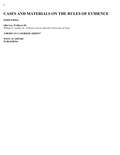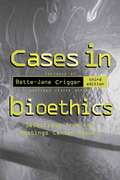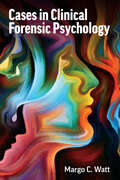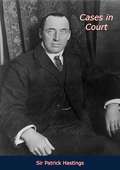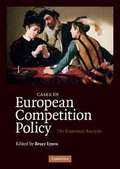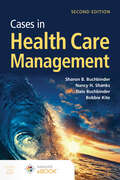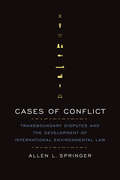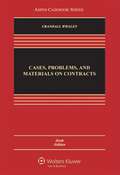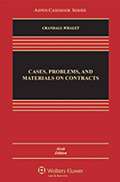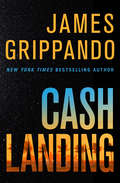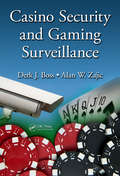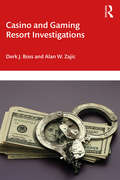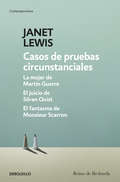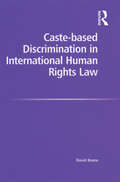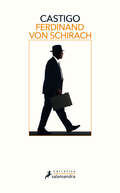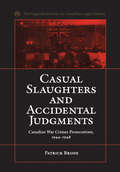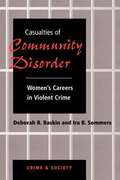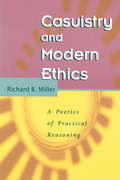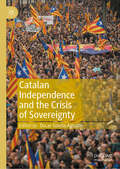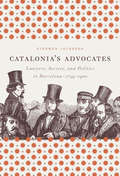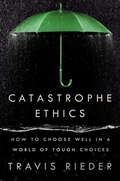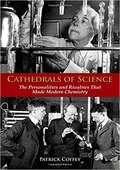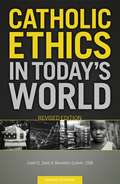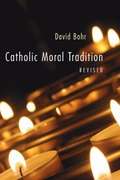- Table View
- List View
Cases and Materials on the Rules of Evidence (American Casebook Series)
by Olin Wellborn IIIThis book offers reasonably thorough materials that are at the same time brief enough that the whole subject can actually be covered in a four- credit course (or most of it in a three-credit course). <p><p>Although some students may wish to consult a secondary text for further explanation or summary, these materials are meant to be self-sufficient when accompanied by a current copy of the Federal Rules of Evidence (and, where appropriate, the rules of a state).
Cases in Bioethics: Selections from the Hastings Center Report
by Bette-Jane CriggerCases in Bioethics, Third Edition, contains 59 cases, each of which presents a difficult question that regularly confronts medical practitioners. Each case is discussed by two or three ethicists, physicians, or hospital administrators, placing students in the thick of each difficult situation.
Cases in Clinical Forensic Psychology
by Margo C. WattClinical forensic psychology is defined by the application of clinical psychology – assessment, diagnosis, treatment, and consultation – in legal contexts. The term captures the integration of clinical psychology as an applied professional discipline and forensic psychology as an experimental discipline. Cases in Clinical Forensic Psychology offers a series of case studies that allow readers to take an up-close and personal look at the criminal justice system in Canada. Clinical forensic psychologist Margo C.Watt examines the particulars of each case, including the biological, psychological, social, cultural, and legal factors. The book takes an evidence-based approach and highlights how the science of clinical forensic psychology informs all aspects of criminal cases: police investigative techniques, eyewitness testimony, pretrial publicity, jury selection and decision-making, forensic evaluations, psychological autopsies, mental health in corrections, and mo.re. Examining incidents ranging from false confessions to wrongful convictions to deaths in custody and the criminals who got away, Cases in Clinical Forensic Psychology questions how and why these events happened and considers what we can learn from them.
Cases in Court
by Sir Patrick HastingsCASES IN COURT is a personal account of his most memorable trials by a great British barrister whose name was world-famous. In all of the cases described he played a leading part. Here, as he writes in his preface, are “pictures of the litigants themselves: just ordinary human beings seeking redress against their wrongs, real or imaginary; men and women struggling to protect their reputations and perhaps their lives.” There are five notorious murder trials, including “The Case of the Blazing Car”, “The Case of the Hooded Man”, and the extraordinary case of Mrs. Barney; six trials for libel or slander, including the action brought by a Russian Princess against a film corporation, “The Case of the Three Sisters”, “The Case of the Illuminating Dot”, and “The Case of the Talking Mongoose”; and ten other miscellaneous cases that were headlined in their day. At the end of the book the author briefly discusses good and bad advocacy, and answers some interesting questions that are often asked about a barrister’s profession.
Cases in European Competition Policy: The Economic Analysis
by Bruce LyonsCompetition between firms is usually the most effective way of delivering economic efficiency and what consumers want. However, there is a balance to be struck. Firms must not be over-regulated and so hampered in their development of innovative products and new strategies to compete for customers. Nor must they be completely free to satisfy a natural preference for monopoly, which would give them higher profits and a quieter life. The economic role of competition policy (control of anticompetitive agreements, mergers and abusive practices) is to maintain this balance, and an effective policy requires a nuanced understanding of the economics of industrial organization. Cases in European Competition Policy demonstrates how economics is used (and sometimes abused) in competition cases in practical competition policy across Europe. Each chapter summarizes a real case investigated by the European Commission or a national authority, and provides a critique of key aspects of the economic analysis.
Cases in Health Care Management
by Sharon B. Buchbinder Nancy H. Shanks Dale Buchbinder Bobbie J KiteThe new Second Edition of Cases in Health Care Management is a collection of over 100 new and cutting-edge case studies designed to help illustrate the challenges related to managing the health care services. Organized into nine content areas, from Leadership, Management, and Quality/Patient Safety; to Health Disparities and Cultural Competence, Ethics, and more, these realistic scenarios span the full spectrum of issues that can arise in a variety of health care services settings. Appropriate for all levels of higher education, this text engages students in active learning through lively writing and storytelling techniques that pull them into the story while giving them fresh, provocative real-world scenarios to analyze and critique. Furthermore, the authors have incorporated diversity, equity, and inclusion (DEI) and cultural competency throughout to encourage greater cultural awareness, sensitivity, and fairness.
Cases of Conflict: Transboundary Disputes And The Development Of International Environmental Law
by Allen L. SpringerCases of Conflict focuses on times of dispute as important moments in the development of international environmental law. Conflict tests international law—both its content and its relevance become clearer in times of controversy—but conflict can also help shape the law. Drawing from a growing body of scholarship connecting the fields of international relations and international law, Cases of Conflict examines six prominent case studies to demonstrate how transboundary disputes have influenced the development of international environmental law and policy. Embracing their rich detail and real-world messiness, this book looks to develop a better understanding of the true content and potential of international environmental law.
Cases, Problems and Materials on Contracts 6th Edition
by Thomas D. Crandall Douglas J. WhaleyCases, Problems, and Materials on Contracts is distinguished among other texts by its excellent organization and thorough coverage of the basic themes of contract law.
Cases, Problems, and Materials on Contracts (Aspen Casebook Series)
by Douglas J. Whaley David HortonCases, Problems, and Materials on Contracts is known for pioneering the problem method of law school teaching. A staple in classrooms for decades, it stands out from other texts in the scope of its coverage and its use of short, carefully-constructed Problems to expose students to new concepts, reinforce what they have just learned, and stimulate thought. The Eighth Edition, the first since the passing of Thomas Crandall and the addition of David Horton as co-author, is more accessible than ever. It introduces complicated issues with a clear narrative summary or explicit statement of black-letter law. The cases have been tightly edited for best effect. The book can also be easily adapted to fit various pedagogical needs. Although it starts with “Agreement” and moves to “Consideration,” it is also designed for teachers who prefer to begin with “Consideration” or “Remedies.” It can be used in courses that both include and exclude sales. Finally, because it is shorter than most other texts in this field, it works in 4-unit, 5-unit, and 6-unit courses. <p><p> New to the Eighth Edition: <p><p> Substantial input from a new co-author means that the book contains scores of new cases, Problems, and narrative introductions to issues. Each opinion has been streamlined to enhance readability. Where possible, applicable Restatement of Contracts and Uniform Commercial Code sections have been printed in the text, saving students the cost of buying separate supplements.
Cash Landing
by James GrippandoThe New York Times bestselling author of Cane and Abe and Black Horizon delivers a wild, suspenseful story inspired by actual events, in which a band of amateur thieves pulls off one of the biggest airport heists in history, with deadly consequences.Every week, a hundred million dollars in cash arrive at Miami International Airport, shipped by German banks to the Federal Reserve. A select group of trusted workers moves the bags through customs and loads them into armored cars.Ruban Betancourt has always played by the rules. But when the bank takes his house and his restaurant business goes bust, he is driven over the edge. He and his wife deserve more than what life has handed them, and he's come up with a scheme to get a little payback. Ruban, with the help of an airport insider, his cokehead brother-in-law, Jeffrey, and two ex-cons, surprise the guards transferring the money to the armored cars and speed off with $7.4 million in the bed of a pickup truck.Investigating the heist, FBI agent Andie Henning, newly transferred to Miami from Seattle, knows that the best way to catch the thieves is to follow the money. Jeffrey's drug addiction is as conspicuous as the Rolex watches he buys for dancers at the Gold Rush strip joint. And one of the ex-cons, Pinky Perez, makes no secret of his plan to own a swingers' club, which will give him carte blanche with his patrons' wives. Meanwhile, levelheaded Ruban is desperately trying to lie low and hold things together.But Agent Henning isn't the only one on their trail, and in mob-meets-Miami fashion, these accidental thieves suddenly find themselves in way over their heads and sinking fast.
Casino Security and Gaming Surveillance
by Derk J. Boss Alan W. ZajicAlmost all incidences of cheating, theft, fraud, or loss can be detected through the surveillance of critical transactions, audit observations, and reviews of key metrics. Providing proven-techniques for detecting and mitigating the ever-evolving threats to casino security, this book covers the core skills, knowledge, and techniques needed to protect casino assets, guests, and employees. Drawing on the authors six decades of combined experience in the industry, Casino Security and Gaming Surveillance identifies the most common threats to casino security and provides specific solutions for addressing these threats. From physical security and security management to table and gaming surveillance, it details numerous best practice techniques, strategies, and tactics, in addition to the metrics required to effectively monitor operations. The authors highlight valuable investigation tools, including interview techniques and evidence gathering. They also cover IOU patrol, tri-shot coverage, surveillance audits, threat analysis, card counting, game protection techniques, players club theft and fraud, surveillance standard operating procedures, nightclub and bar security, as well as surveillance training. Complete with a glossary of gaming terms and a resource-rich appendix that includes helpful forms, this book covers everything surveillance and security professionals need to know to avoid high-profile incidents, costly compliance violations and damage to property and revenue. It‘s professionals like Al and Derk who personify the professionalism that is crucial when establishing and operating modern casino security and surveillance departments. This book will quickly become the Bible for any security and surveillance officer.
Casino and Gaming Resort Investigations
by Derk J. Boss Alan W. ZajicCasino and Gaming Resort Investigations addresses the continued and growing need for gaming security professionals to properly and successfully investigate the increasing and unique types of crime they will face in their careers. As the gaming industry has grown, so has the need for competent and highly skilled investigators who must be prepared to manage a case of employee theft one day to a sophisticated sports book scam the next. This book provides the reader with the fundamental knowledge needed to understand how each gaming and non-gaming department functions and interacts within the overall gaming resort, allowing the investigator to determine and focus on the important elements of any investigation in any area. Each chapter delivers a background of a department or type of crime normally seen in the gaming environment, and then discusses what should be considered important or even critical for the investigator to know or determine in the course of the investigation. Likely scenarios, case histories, and tips, as well as cautions for investigators to be aware of, are used throughout the book. This book was written for and directed at gaming security and surveillance professionals, including gaming regulators, and tribal gaming authorities, who are almost daily confronted by the ingenious and the most common scams, theft, and frauds that are perpetrated in the gaming world.
Casos de pruebas circunstanciales: La mujer de Martin Guerre | El juicio de Sören Qvist | El fantasma de Monsieur Scarron
by Janet LewisLas tres novelas que forman la célebre trilogía de Janet Lewis «Casos de pruebas circunstanciales», reunidas en un solo volumen. La trilogía de Janet Lewis está basada en algunos de los errores judiciales que aparecen en el tratado sobre la Ley de la prueba que el jurista inglés Samuel March Philips escribió en el siglo XIX. Lewis escribió estas novelas a lo largo de dos décadas, fascinada por la forma en que las pruebas circunstanciales y los relatos de los testigos pueden sentenciar el destino de una persona, así como la forma en que la construcción del relato se impone con tal fuerza que amenaza con diluir la realidad o la búsqueda de la verdad. A pesar de la variedad de escenarios y circunstancias, desde el célebre caso de la duplicidad de identidades en La mujer de Martin Guerre, la trágica historia del pastor protestante injustamente ajusticiado en El juicio de Sören Qvist y el trasfondo político en el marco de la gran hambruna de 1693-1694 durante el reinado de Luis XIV en El fantasma de Monsieur Scarron, Janet Lewis refleja con gran maestría la compleja encrucijada entre la ley y la justicia. Crítica:«No errarán demasiado quienes auguran que dentro de un siglo Janet Lewis gozará de un rango similar al de Stendhal y Hawthrone, incluso Flaubert y Melville, en la historia de la literatura.»Javier Marías
Caste-based Discrimination in International Human Rights Law
by David KeaneWith particular focus on the Hindu caste system, this book represents a comprehensive analysis of the elimination of all forms of racial discrimination in international law. It evaluates the strategies that have informed the work of the United Nations in this area, mapping a new path that moves from standard-setting to implementation. Combining legal analysis with the meaning and origin of caste, it explores the remedies human rights law can propose towards the prohibition of caste-based discrimination, and the abolition of the caste system itself. The book provides a benchmark on the achievements of the international community in combating all forms of racial discrimination, and the policies that must inform future measures. With its clear and accessible style this volume will be of interest to scholars of law and human rights, as well as policy-makers and practitioners working in this area.
Castigo
by Ferdinand von SchirachTras Crímenes y Culpa, el jurista alemán Ferdinand von Schirach regresa con Castigo. Basada en casos reales, Crímenes, la primera obra de Ferdinand von Schirach, ganadora del prestigioso Premio Kleist y uno de los mayores éxitos de los últimos años en Alemania, fascinó y conmovió por la honestidad y lucidez con que planteaba la búsqueda de la verdad en los procesos criminales. Culpa, una colección de punzantes miniaturas sobre el insondable comportamiento humano, mereció de nuevo el elogio de la crítica y los lectores. Ahora, Von Schirach vuelve a convertir doce casos de su dilatada trayectoria profesional en sendas piezas de orfebrería literaria que tratan, con su aguzado instinto narrativo y su particular sentido del humor, las consecuencias penales y morales del castigo. Una mujer que asume la culpa del delito de parricidio cometido por su marido, los efectos catastróficos de un juicio cancelado tras declarar no apto a un miembro del jurado popular y un hombre con las funciones de la corteza cerebral dañadas al haber resbalado con el collar de perlas de su amante son algunos de los sustanciosos argumentos de estas turbadoras historias rebosantes de ingenio y reflexiones agudas sobre la naturaleza humana. Al tiempo que resalta los elementos más imponderables del poder judicial y pone el foco en los sentimientos más frágiles y secretos que anidan en nuestro interior, Castigo nos habla de lo que sucede tras una sentencia firme, un hipotético accidente o un crimen planificado. En algunos relatos, el castigo resulta fortuito pero oportuno, mientras que en otros adquiere forma de venganza deliberada. Y aunque en ocasiones éste sea injusto y doloroso, puede significar la única vía hacia la salvación. La crítica ha dicho...«Doce relatos inolvidables sobre el sistema judicial. Implacables, precisos, fríamente distantes y, también, profundamente humanos.»Claudio Armbruster, ZDF «Una y otra vez, me sorprende la capacidad de Ferdinand von Schirach para captar lo contradictorio en los entornos más reducidos, para dibujar el gran espacio emocional en pocas palabras. Una y otra vez, me siento conmovido por esta combinación de precisión no sentimental y maravillosa, la empatía filantrópica que hace que sus textos sean incomparables.»Michael Haneke «La literatura de Von Schirach mira de cerca, con claridad y enorme lucidez, aunque lo que tenga que explicar no siempre sea bonito.»Focus «Pocos autores son capaces de provocar sentimientos tan intensos con tan pocas palabras. Von Schirach es un narrador compasivo y muy humano.»Abendzeitung
Casual Slaughters and Accidental Judgments: Canadian War Crimes Prosecutions 1944-1948
by Patrick BrodeWar crimes prosecutions create unique difficulties as civilian standards of law are applied to the extraordinary circumstances of war. Governments are often surprisingly hesitant to pursue war criminals. Patrick Brode has produced a fascinating study of such issues in Casual Slaughters and Accidental Judgements, a history of Canada's prosecution of war crimes committed during the Second World War. It is a history that includes personalities such as Lt. Col. Bruce Macdonald, whose persistence overcame Ottawa's reluctance to pursue the 'war crimes business,' and SS Brigadeführer Kurt Meyer, whose last-minute reprieve from death by firing squad followed a trial reminiscent of a Hollywood melodrama. Brode illustrates the difficulties of applying law to a recently defeated enemy when the emotions and politics of war distort any sense of impartial justice. The trials also reveal much about the legal and diplomatic views that prevailed at the end of the war and democratic Canada's willingness to overcome its colonial past to defend its own interests on the international stage.<P><P>The objectivity of the trials is still subject to question and they have been condemned by some as retaliatory. Brode clearly shows that Canada's war crimes trials of 1945 to 1948 were a part of a movement to apply humane standards of conduct to warfare. Recent events in places such as Vietnam, Bosnia, and Somalia show how pertinent these concerns remain.
Casualties of Community Disorder: Women's Careers in Violent Crime
by Deborah R. Baskin Ira B. SommersUnlike the outcry over street crime committed by males, concerns about women and violence have centered primarily on their roles as victims of sexual and physical violence committed by strangers and by males in intimate relationships. Rarely is violence by women considered in the development or testing of theories of aggression. The book provides a detailed account of the criminal careers of 170 women who committed violent street crimes in New York City, describing their entry into criminal activities, their development into persistent street criminals, and, for some, their eventual transition out of street crime. Unlike other qualitative works in this area,Casualties of Community Disorder offers more than cultural analysis. Deborah Baskin and Ira Sommers integrate structural and individual levels of explanation by examining the career patterns of female violent offenders and the relationships of these women to family members and communities. Through the use of census data, analyses of political and economic changes, and ethnographic observations of activities specific to these communities, the authors provide a perspective on the relationship of individual decisions to structural constraints. The research presented here clearly challenges contemporary assumptions regarding female offending. Baskin and Sommers' analysis suggests a complex relationship of social and individual factors that serves as a caution against generic and gender-based generalizations that have been drawn from time-bound, aggregate level data sets and from ethnographies of women's involvement in street hustling. Finally, in Casualties of Community Disorder, the street drug and criminal subculture is understood through the words of those who usually are spoken for, studied, and objectified.
Casuistry and Modern Ethics: A Poetics of Practical Reasoning
by Richard B. MillerDid the Gulf War defend moral principle or Western oil interests? Is violent pornography an act of free speech or an act of violence against women? <p><p>In this book the author sheds new light on the potential of casuistry--case-based reasoning--for resolving these and other questions of conscience raised by the practical quandaries of modern life. Rejecting the packaging of moral experience within simple descriptions and inflexible principles, he argues instead for identifying and making sense of the ethically salient features of individual cases. Because this practical approach must cope with a diverse array of experiences, he draws on a wide variety of diagnostic tools from such fields as philosophy of science, legal reasoning, theology, literary theory, hermeneutics, and moral philosophy. <p><p>Opening new avenues for practical reasoning, the author's interdisciplinary work will challenge scholars who are interested in the intersections of ethics and political philosophy, cultural criticism, and debates about method in religion and morality.
Catalan Independence and the Crisis of Sovereignty
by Óscar García AgustínThis book explores the conflict between the Catalan project to become independent and the Spanish state’s opposition to any attempt of secessionism. The volume addresses some of the key political and academic issues of contemporary European societies: nationalism, separatism and sovereignty. The banned referendum in Catalonia in October 2017 unveiled the existence of multiple crises, from territorial to economic and political. Indeed, the Catalan issue is about the crisis of sovereignty: who holds legitimacy to make decisions, and who is in power legally and politically? The book is structured according to three themes: sovereignty and its people, where the realignment to independence, populism and the definition of the demos are discussed; collective identities and actions, to account for the shaping of ‘us’, the importance of collective memory and the cross-alliances forged during the referendum; and internationalization, focusing on Europeanisation, international media and comparative constitutional perspectives.
Catalonia's Advocates: Lawyers, Society, and Politics in Barcelona, 1759-1900
by Stephen JacobsonOffering a window into the history of the modern legal profession in Western Europe, Stephen Jacobson presents a history of lawyers in the most industrialized city on the Mediterranean. Far from being mere curators of static law, Barcelona's lawyers were at the center of social conflict and political and economic change, mediating between state, family, and society. Beginning with the resurrection of a decadent bar during the Enlightenment, Jacobson traces the historical evolution of lawyers throughout the long nineteenth century. Among the issues he explores are the attributes of the modern legal profession, how lawyers engaged with the Enlightenment, how they molded events in the Age of Revolution and helped consolidate a liberal constitutional order, why a liberal profession became conservative and corporatist, and how lawyers promoted fin-de-si cle nationalism. From the vantage point of a city with a distinguished legal tradition,Catalonia's Advocatesprovides fresh insight into European social and legal history; the origins of liberal professionalism; education, training, and the practice of law in the nineteenth century; the expansion of continental bureaucracies; and the corporatist aspects of modern nationalism.
Catastrophe Ethics: How to Choose Well in a World of Tough Choices
by Travis RiederHow to live a morally decent life in the midst of today's constant, complex choices In a world of often confusing and terrifying global problems, how should we make choices in our everyday lives? Does anything on the individual level really make a difference? In Catastrophe Ethics, Travis Rieder tackles the moral philosophy puzzles that bedevil us. He explores vital ethical concepts from history and today and offers new ways to think about the &“right&” thing to do when the challenges we face are larger and more complex than ever before. Alongside a lively tour of traditional moral reasoning from thinkers like Plato, Mill, and Kant, Rieder posits new questions and exercises about the unique conundrums we now face, issues that can seem to transcend old-fashioned philosophical ideals. Should you drink water from a plastic bottle or not? Drive an electric car? When you learn about the horrors of factory farming, should you stop eating meat or other animal products? Do small commitments matter, or are we being manipulated into acting certain ways by corporations and media? These kinds of puzzles, Rieder explains, are everywhere now. And the tools most of us unthinkingly rely on to &“do the right thing&” are no longer enough. Principles like &“do no harm&” and &“respect others&” don&’t provide guidance in cases where our individual actions don&’t, by themselves, have any effect on others at all. We need new principles, with new justifications, in order to navigate this new world. In the face of consequential and complex crises, Rieder shares exactly how we can live a morally decent life. It&’s time to build our own catastrophe ethics.
Cathedrals Of Science: The Personalities And Rivalries That Made Modern Chemistry
by Patrick CoffeyIn Cathedrals of Science, Patrick Coffey describes how chemistry got its modern footing-how thirteen brilliant men and one woman struggled with the laws of the universe and with each other. They wanted to discover how the world worked, but they also wanted credit for making those discoveries, and their personalities often affected how that credit was assigned. Gilbert Lewis, for example, could be reclusive and resentful, and his enmity with Walther Nernst may have cost him the Nobel Prize; Irving Langmuir, gregarious and charming, "rediscovered" Lewis's theory of the chemical bond and received much of the credit for it. Langmuir's personality smoothed his path to the Nobel Prize over Lewis. Coffey deals with moral and societal issues as well. These same scientists were the first to be seen by their countries as military assets. Fritz Haber, dubbed the "father of chemical warfare," pioneered the use of poison gas in World War I-vividly described-and Glenn Seaborg and Harold Urey were leaders in World War II's Manhattan Project; Urey and Linus Pauling worked for nuclear disarmament after the war. Science was not always fair, and many were excluded. The Nazis pushed Jewish scientists like Haber from their posts in the 1930s. Anti-Semitism was also a force in American chemistry, and few women were allowed in; Pauling, for example, used his influence to cut off the funding and block the publications of his rival, Dorothy Wrinch. Cathedrals of Science paints a colorful portrait of the building of modern chemistry from the late 19th to the mid-20th century.
Catholic Bioethics for a New Millennium
by Anthony FisherCan the Hippocratic and Judeo-Christian traditions be synthesized with contemporary thought about practical reason, virtue and community to provide real-life answers to the dilemmas of healthcare today? Bishop Anthony Fisher discusses conscience, relationships and law in relation to the modern-day controversies surrounding stem cell research, abortion, transplants, artificial feeding and euthanasia, using case studies to offer insight and illumination. What emerges is a reason-based bioethics for the twenty-first century; a bioethics that treats faith and reason with equal seriousness, that shows the relevance of ancient wisdom to the complexities of modern healthcare scenarios and that offers new suggestions for social policy and regulation. Philosophical argument is complemented by Catholic theology and analysis of social and biomedical trends, to make this an auspicious example of a new generation of Catholic bioethical writing which has relevance for people of all faiths and none.
Catholic Ethics in Today's World (Revised Edition)
by Jozef D. Zalot Benedict Guevin<p>Authors Jozef Zalot and Benedict Guevin, OSB, offer a pragmatic and insightful presentation on the compelling and sometimes misunderstood teachings of the Catholic Church on contemporary ethical issues.In their revised edition of Catholic Ethics in Today's World, the authors further clarify their discussion on the Church's stance on ethics, explicating Church teachings and expounding on the reasons behind those teachings. The authors also illuminate reasons for this confusion about what the Church teaches regarding challenging ethical dilemmas, among them the Church's deficiency in clearly articulating official Church teachings for a lay audience, the media's misinterpretation of those teachings, and the lack of ethics training for some educators. <p>To further clarify the Church's teaching on ethics, in this revised edition the authors add material that addresses recent developments, most notably the thought-provoking ethical dilemmas centered on the nation's recent recession, international debt relief, the continued fighting in Afghanistan, premarital sex and cohabitation, beginning of life issues, including federal funding for embryonic stem cell research, and end of life issues, including discussions on euthanasia and physician-assisted suicide. The authors' intent is to explain Catholic teachings so that a clear ethics of morality can arise.</p>
Catholic Moral Tradition
by David BohrThis book presents an introductory summary of contemporary Catholic moral teaching based upon the renewal mandated by the Second Vatican Council. It also incorporates subsequent Church documents, especially the moral encyclicals of John Paul II--'Veritatis Splendor' and 'Evangelium Vitae'--along with his three encyclicals on Catholic social doctrine and the 'Catechism of the Catholic Church'.
